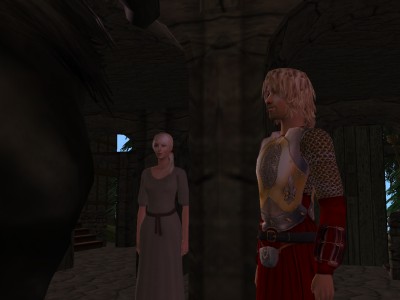
King Sigefrith had galloped up the road and over the bridge so quickly, so suddenly that the guards could not have stopped him if he had been an enemy. As it was, they moved anxiously around him as if frightened of him.
The horse was too exhausted for such a mad dash at the end of the long journey, but Sigefrith would not have cared if the animal had been lamed for life. He did not think he would even have cared if the horse had foundered in full gallop and broken his own and his rider’s necks.
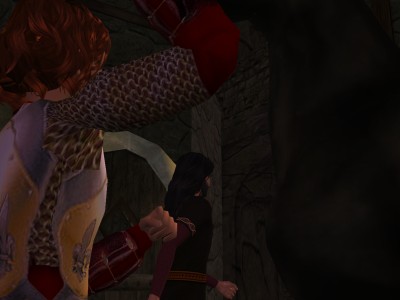
He and Sir Sigefrith had ridden back into the valley in high spirits, but as they approached the edge of the farmlands and began meeting the peasants on the roads, Sigefrith had soon realized that something was very wrong. The people met his smiles and waves with half-hearted cheers, and they turned to one another immediately afterwards to speak excitedly among themselves.
Sigefrith had been a knight and a king for many years; he had led peasant people through times of fear and famine and led soldiers into battle. He knew how to measure the mood of a crowd by sifting out the words that were on everybody’s lips.
As they rode, the words that kept coming up to him were “young” and “princess” and “does he know?” and “has he been told?”

There was one word that he was not hearing, but before long he saw it floating at some distance before his eyes, like letters of flame written by some divine, disembodied hand, like his own vision of the writing on the wall: EMMA, EMMA, TEKEL, UPHARSIN.
He had ridden fast enough that Sir Sigefrith in his prudence, or Sir Sigefrith’s horse in his exhaustion, had not kept up.
He had ridden alone as far as the King’s Road, and as he approached the castle he saw what he had most feared: the flags on the gatehouse furled, and the flags on the towers floating at half-staff.
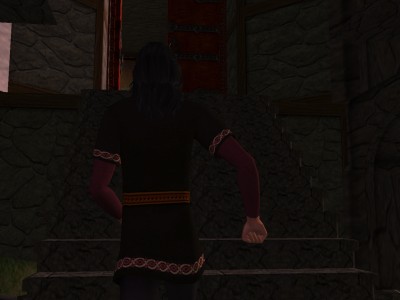
He had not felt such anguished, gut-melting fear since he had seen Maud fling herself away from the tower’s edge as if she were a bird expecting to fly. But that terror had only lasted a instant – though it had seemed an eternity then! – before she had screamed, and before the thump far below that had been the last sound she had ever made.
Now the terror had lasted all through that wild ride down the road past Bernwald fields, down past the old church, down the King’s Road to this castle that seemed an undiscovered country to him now: he thought that there was nothing more disorienting than seeing one’s own flag flying at half-staff for a death of which one has not yet learned.
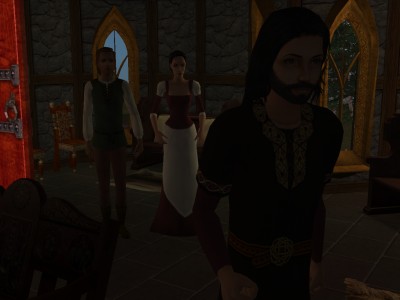
No one spoke to him as he ran through the court and up the stairs. The maid and man in the old hall were too startled to speak as he ran through into the new – into the new hall where he knew he would find Emma if Emma were anywhere to be found.

This was Emma’s own hall. This was where Emma liked to play, where she could open the doors onto the cloister and run in and out as she liked. Emma! His baby girl! Maud’s last living child! His Emmie-Em! His ginger baby! She was not here.

He fell to his knees and howled her name, as he had not howled since he had seen Maud lying still and dead four stories below.
There was that same silence that followed, and then – miracle of miracles – the door to the cloister opened and his own Emma came running in.

Sigefrith could not believe. He had heard the people. He had seen the flags. He had seen the writing on the wall.

She did not speak, but looked at him with such mournful eyes – Maud’s own eyes! – that he began to think he was seeing the ghost of Emma – a vision of Emma – or that he had simply been struck mad with his grief.

“Emmie?” he whispered.
He dared not touch her: as the Lord had said, a spirit had not flesh and bones. But he remembered that the Lord had not mentioned hair, and so he dared lift the ends of her hair with his trembling fingers.

Her hair was real, silky and cool, and it glowed with all the warm chestnut her mother’s hair had only hinted at. It was Emma. It was his ginger baby.
Laughing, he pulled her head down to his and kissed it – and then he sobbed as he understood what the people had meant.
Britamund too was still a “young princess”. She was only twelve – No! She was thirteen, and he had missed her birthday. Or had she even lived that long?
He laid his hands on Emma’s shoulders, hung the weight of his arms from Emma’s thin shoulders as if a nine-year-old girl could bear such grief–
And then a little hand was on his forty-one-year-old shoulder, and he turned his head to see Britamund herself looking down at him with a quivering smile and sorrowful eyes – Maud’s own eyes!

Sigefrith laughed again in elation and rose to embrace the girl. His Princess! The only eldest daughter he would ever have! Who had brought him such fear in the month before her birth and such joy in the thirteen years afterwards!

Truly he was a lucky man. He had had two miracles in one day – two daughters returned to him from the unconquerable country in which he had briefly believed them. He had simply misunderstood the peasants! He had simply–
And then he understood.
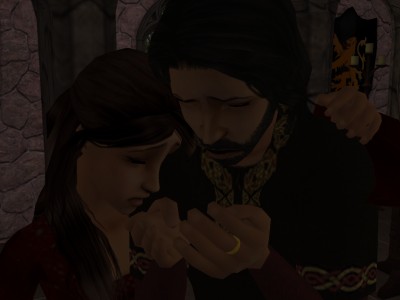






Oh no! Poor Sigefrith! Poor Eadie!
You can't leave it llike this! You have us on pins and needles again! What happened? Will Sigefrith ever be able to forgive himself for not being there? Tell us more. Tell us more.